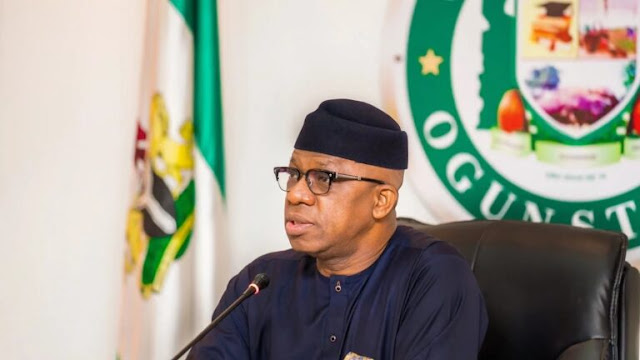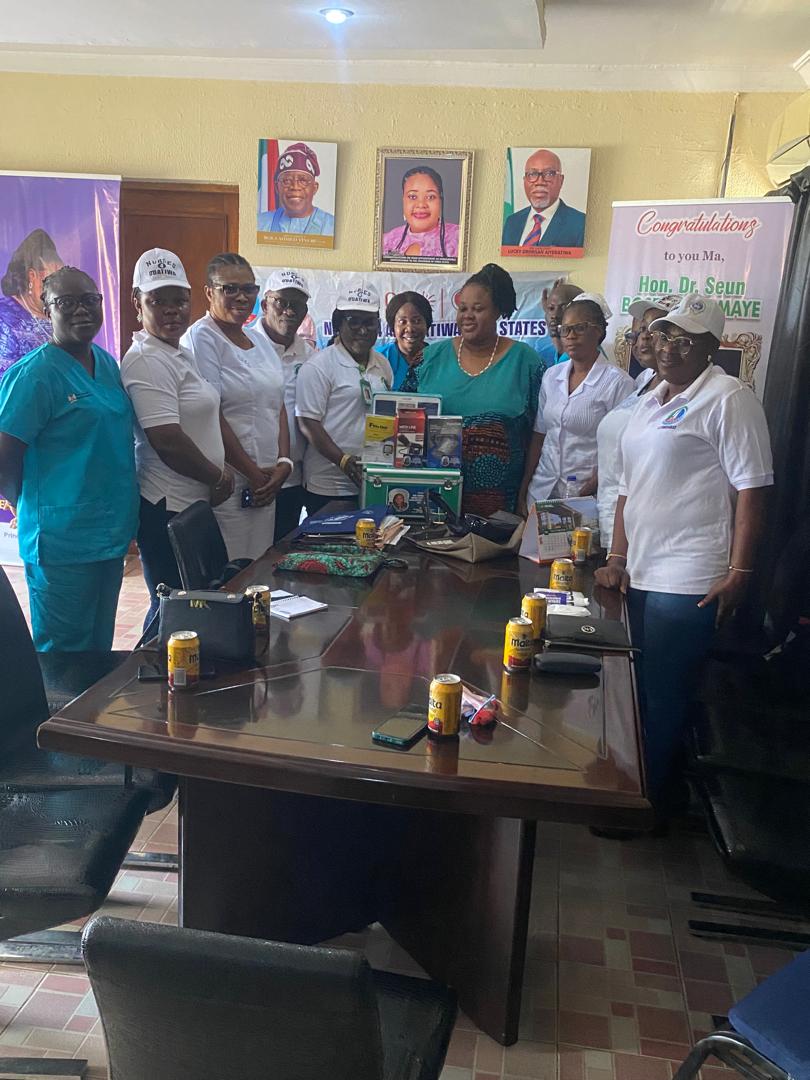Abeokuta, Ogun State, Nigeria – On August 30, 2025, the Ogun State Government announced the release of 130 hectares of land along the Epe/Mojoda Expressway in Ijebu Ode to the Federal Government for the proposed Ijebu Ode Port Terminal Project. This strategic decision follows a formal request from the Minister of Marine and Blue Economy, Mr. Gboyega Oyetola, in a letter dated June 26, 2025, addressed to Governor Dapo Abiodun. The project, a cornerstone of Nigeria’s efforts to decongest its port system and stimulate economic growth, is poised to transform Ogun State into a logistics and industrial hub, enhancing national trade, boosting the Gross Domestic Product (GDP), and fostering sustainable development across the South-West region.
The Ijebu Ode Inland Dry Port, which will be linked to the Lekki Deep Sea Port via a rail network, is expected to serve as a cargo consolidation and distribution hub, easing congestion at Lagos ports, enhancing regional competitiveness, and promoting economic prosperity. Governor Abiodun described the initiative as a critical enabler of industrialization, complementing other projects like the Gateway International (Agro-Cargo) Airport and the Kajola Inland Dry Port. Analysts highlight the project’s potential to strengthen Ogun State’s industrial hub initiative, create jobs, and improve the aesthetic and functional value of the surrounding communities. This article provides a comprehensive analysis of the Ijebu Ode Port Terminal Project, its implications for Ogun State and Nigeria, and the broader context of Nigeria’s maritime and economic development strategies.
The Ijebu Ode Port Terminal Project: A Strategic Initiative
The allocation of 130 hectares of land for the Ijebu Ode Port Terminal Project marks a significant milestone in Nigeria’s efforts to modernize its port infrastructure and stimulate economic growth. The project, initiated following a request from the Minister of Marine and Blue Economy, Gboyega Oyetola, is part of a broader federal government strategy to decongest the overburdened Lagos port system, which has long been a bottleneck for trade and commerce in Nigeria. The Ijebu Ode Inland Dry Port is designed to serve as a cargo consolidation and distribution hub, streamlining logistics and reducing delays associated with port congestion.
According to analysts, the project will have far-reaching economic benefits, including boosting national trade, increasing GDP, and creating employment opportunities, particularly for youths in Ogun State and the South-West region. The port’s strategic location within the Economic Development Cluster of Ijebu Ode enhances its potential to drive industrial investment by reducing production costs through an efficient logistics and transportation network. The integration of the port with the Lekki Deep Sea Port via a rail system further amplifies its impact, connecting it to other regional hubs such as the Kajola and Moniya Inland Dry Ports and the Gateway International (Agro-Cargo) Airport.
Governor Dapo Abiodun, in announcing the approval, emphasized the transformative potential of the project. “The Ijebu-Ode Inland Dry Port and the Gateway International Airport are critical enablers of industrialization and regional competitiveness. Together, they will transform Ogun State into a logistics and economic powerhouse, creating prosperity for our people and opportunities for Nigeria at large,” he stated. The governor’s remarks highlight the project’s role in positioning Ogun State as a key player in Nigeria’s economic landscape, leveraging its proximity to Lagos and its strategic infrastructure investments.
Economic and Regional Implications
The Ijebu Ode Port Terminal Project is expected to deliver significant economic and regional benefits, aligning with Nigeria’s broader goals of economic diversification and industrial growth. Analysts predict that the port will ease congestion at Lagos ports, which handle over 80% of Nigeria’s maritime trade but are plagued by inefficiencies, delays, and high costs. By serving as a dry port, Ijebu Ode will facilitate the movement of goods to and from the Lekki Deep Sea Port, reducing pressure on Lagos and improving the efficiency of cargo handling.
The project is also expected to enhance Ogun State’s industrial hub initiative, which aims to position the state as a leading destination for manufacturing and investment. Ogun State, often referred to as the “Gateway State,” has already attracted significant industrial investment due to its proximity to Lagos, favorable business policies, and infrastructure development under Governor Abiodun’s administration. The Ijebu Ode Port Terminal will further enhance the state’s attractiveness to investors by providing a robust logistics network that reduces transportation costs and improves market access.
The port’s integration with a rail network connecting to the Lekki Deep Sea Port, Kajola, Moniya, and the Gateway International Airport creates a seamless logistics ecosystem that enhances regional connectivity. This network will facilitate the movement of goods across the South-West, connecting Ogun State to Oyo State and other parts of Nigeria. The rail link is particularly significant, as it addresses Nigeria’s longstanding challenge of inadequate transportation infrastructure, which has hindered economic growth and trade efficiency.
In addition to economic benefits, the project is expected to promote serenity and aesthetic value in the Ijebu Ode area. By developing modern infrastructure and improving the surrounding environment, the port will enhance the quality of life for residents and create a more attractive setting for businesses and visitors. The focus on aesthetics reflects Governor Abiodun’s vision of holistic development, which combines economic progress with social and environmental considerations.
Job Creation and Youth Empowerment
One of the most significant impacts of the Ijebu Ode Port Terminal Project is its potential to generate employment opportunities, particularly for youths in Ogun and Oyo states. The Minister of Marine and Blue Economy, Gboyega Oyetola, highlighted this during the 2025 Budget Defence to the Joint Committee of the Senate on Marine Transport and House of Representatives Committees on Ports and Harbour, Maritime Safety, Education and Administration, Inland Waterways, and Shipping Services. “The Inland Dry Ports, when completed, will generate jobs for the teeming youths of Ogun and Oyo states and other states in the South-Western part of the country,” Oyetola stated.
The project is expected to create direct and indirect jobs in areas such as logistics, warehousing, transportation, and port operations. The construction phase alone will provide opportunities for local contractors, engineers, and laborers, while the operational phase will create long-term employment in cargo handling, customs services, and related industries. These jobs are critical in a region with high youth unemployment, offering opportunities for economic empowerment and social mobility.
The focus on youth empowerment aligns with President Bola Tinubu’s Renewed Hope Agenda, which prioritizes job creation, economic diversification, and inclusive growth. The approval of the Ijebu Ode and Moniya Inland Dry Ports in January 2025 by President Tinubu reflects the federal government’s commitment to addressing these priorities, with the projects targeted for fast-tracked delivery to maximize their economic impact.
Strategic Balancing of Industrial Growth
The allocation of land for the Ijebu Ode Port Terminal is part of a broader strategy by the Ogun State Government to balance industrial growth across its three senatorial districts: Ogun Central, Ogun East, and Ogun West. The Kajola Inland Dry Port, already secured for the Ogun Central Industrial Cluster, and the Ijebu Ode Port Terminal for the Eastern corridor demonstrate Governor Abiodun’s commitment to equitable and sustainable development. This approach ensures that all parts of the state benefit from economic opportunities, reducing regional disparities and fostering inclusive growth.
The Ijebu Ode Port Terminal’s location within the Economic Development Cluster of Ijebu Ode enhances its strategic importance. The cluster, which includes industrial zones, commercial hubs, and infrastructure projects, is designed to attract investment and drive economic activity. The port will serve as a catalyst for the cluster’s growth, providing a logistics backbone that supports manufacturing, trade, and export activities. By reducing the cost of production and improving access to markets, the port will make Ijebu Ode a more attractive destination for industrial investment.
The integration of the port with the Gateway International (Agro-Cargo) Airport and other regional infrastructure projects further amplifies its impact. The airport, located in Ilisan-Remo, is designed to support agro-cargo exports, facilitating the movement of agricultural products from Ogun State to international markets. The rail network connecting the port, airport, and other dry ports creates a cohesive logistics ecosystem that positions Ogun State as a regional economic powerhouse.
Federal Government’s Commitment to Maritime Reforms
The Ijebu Ode Port Terminal Project is a key component of the federal government’s efforts to reform Nigeria’s maritime sector and address longstanding challenges. During the 2025 Budget Defence, Minister Oyetola outlined the deficiencies in the maritime sector, including infrastructure decay, silted river courses, inadequate fish production, and a shortage of river crafts. These challenges have hindered the sector’s ability to contribute effectively to Nigeria’s economy, despite its potential to drive trade, job creation, and GDP growth.
Oyetola announced that the Ministry of Marine and Blue Economy is initiating several projects and programs to address these issues, with the Inland Dry Ports in Ijebu Ode and Moniya as flagship initiatives. The fast-tracked delivery of these ports, supported by ongoing design consultancies, reflects the government’s urgency in addressing port congestion and improving trade efficiency. The minister’s address to the Joint Committee of the Senate and House of Representatives underscored the importance of these projects in decongesting the Western Port System and boosting the national economy.
The federal government’s focus on inland dry ports aligns with global trends, where countries are developing inland logistics hubs to complement seaports and improve trade efficiency. By decentralizing port operations, Nigeria aims to reduce the burden on Lagos ports, lower transportation costs, and enhance access to markets for businesses in the hinterland. The Ijebu Ode Port Terminal, with its rail connectivity and strategic location, is a critical part of this vision.
Ogun State’s Industrial Hub Initiative
Under Governor Dapo Abiodun’s leadership, Ogun State has pursued an ambitious industrial hub initiative aimed at transforming the state into a leading destination for manufacturing and investment. The initiative leverages Ogun’s proximity to Lagos, its abundant natural resources, and its favorable business environment to attract local and foreign investors. The Ijebu Ode Port Terminal is a cornerstone of this initiative, providing the logistics infrastructure needed to support industrial growth.
The state’s industrial clusters, including those in Ogun Central and Ogun East, are designed to foster synergy between manufacturing, logistics, and trade. The Kajola Inland Dry Port, located in Ogun Central, supports industries in areas like Abeokuta and Ifo, while the Ijebu Ode Port Terminal enhances the economic potential of the Eastern corridor, including Ijebu Ode, Sagamu, and Ogun Waterside. The Gateway International Airport complements these efforts by providing air cargo capacity, enabling Ogun State to tap into global markets.
The industrial hub initiative has already attracted significant investment, with companies in sectors such as manufacturing, agro-processing, and pharmaceuticals establishing operations in Ogun State. The Ijebu Ode Port Terminal will further enhance the state’s attractiveness by reducing logistics costs and improving market access, making it easier for businesses to operate efficiently and competitively.
Socio-Economic and Environmental Benefits
Beyond its economic impact, the Ijebu Ode Port Terminal Project is expected to deliver significant socio-economic and environmental benefits. The creation of jobs and business opportunities will improve living standards in Ijebu Ode and surrounding communities, reducing poverty and promoting social inclusion. The project’s focus on aesthetics, as highlighted by analysts, will enhance the visual appeal of the area, making it more attractive to residents, businesses, and tourists.
The port’s integration with a rail network will also contribute to environmental sustainability by reducing reliance on road transport, which is a major source of carbon emissions and road congestion in Nigeria. Rail transport is more energy-efficient and environmentally friendly, supporting Nigeria’s commitments to climate change mitigation and sustainable development.
The project’s location within the Economic Development Cluster of Ijebu Ode will also promote community development by attracting infrastructure investments, such as roads, electricity, and water supply. These improvements will enhance the quality of life for residents and create a more conducive environment for businesses, fostering long-term economic and social progress.
Challenges and Opportunities
While the Ijebu Ode Port Terminal Project holds immense promise, it also faces challenges that must be addressed to ensure its success. Key challenges include securing adequate funding for construction and operations, navigating land acquisition issues, and ensuring community buy-in to avoid disputes. The integration of the port with the rail network and other infrastructure projects will require careful coordination among federal, state, and private stakeholders to ensure timely completion.
However, these challenges also present opportunities for innovation and collaboration. The federal government’s commitment to fast-tracked delivery, supported by ongoing design consultancies, suggests a proactive approach to addressing logistical and financial hurdles. The involvement of private sector partners, such as logistics companies and rail operators, could further enhance the project’s efficiency and sustainability.
The project also offers an opportunity to strengthen Nigeria’s maritime sector by addressing deficiencies such as infrastructure decay and inadequate river crafts. By investing in modern port facilities and supporting industries like fishing and inland waterways, the government can unlock the sector’s full potential, creating new revenue streams and economic opportunities.
Community Reactions and Expectations
The announcement of the land allocation for the Ijebu Ode Port Terminal has been met with enthusiasm by residents, community leaders, and business owners in Ogun State. Stakeholders in Ijebu Ode have expressed optimism about the project’s potential to create jobs, attract investment, and improve infrastructure. Youth groups have particularly welcomed the promise of employment opportunities, seeing the port as a pathway to economic empowerment.
However, some community members have called for transparency in the land acquisition process and the inclusion of local stakeholders in project planning. Ensuring that the project benefits local communities, particularly in terms of job creation and infrastructure development, will be critical to maintaining public support. Civil society organizations have also urged the government to prioritize environmental sustainability and community engagement to avoid potential conflicts.
Looking Ahead: A Transformative Vision for Ogun State
The allocation of 130 hectares for the Ijebu Ode Port Terminal Project marks a transformative moment for Ogun State and Nigeria’s economic landscape. Under Governor Dapo Abiodun’s leadership, Ogun State is positioning itself as a logistics and industrial powerhouse, leveraging strategic projects like the Ijebu Ode Port, the Kajola Port, and the Gateway International Airport. The integration of these projects with a rail network and regional hubs creates a cohesive ecosystem that enhances trade, reduces costs, and drives economic growth.
The federal government’s commitment to inland dry ports, as articulated by Minister Gboyega Oyetola, reflects a forward-looking approach to addressing Nigeria’s maritime and economic challenges. By decongesting Lagos ports, creating jobs, and fostering regional connectivity, the Ijebu Ode Port Terminal Project aligns with President Tinubu’s Renewed Hope Agenda, offering a blueprint for sustainable development.
As the project moves forward, its success will depend on effective collaboration among federal, state, and private stakeholders, as well as the engagement of local communities. By addressing challenges and seizing opportunities, the Ijebu Ode Port Terminal can become a catalyst for economic transformation, not only for Ogun State but for Nigeria as a whole. The project’s legacy will be defined by its ability to create prosperity, enhance competitiveness, and improve the lives of millions of Nigerians.







